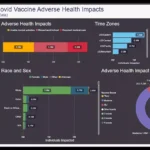After prolonged legal battles, the U.S. Centers for Disease Control and Prevention (CDC) has been forced to release detailed data on adverse events following COVID-19 vaccinations, as recorded in their V-safe system. This move came after significant pressure from public interest groups and a definitive court order. The documents revealed include disturbing reports of severe health incidents, including heart inflammation, miscarriages, and severe neurological issues like Bell's Palsy and seizures.

Scope of Reported Injuries
The data spans 780,000 reports detailing a broad spectrum of health issues that occurred shortly after vaccination. These reports were collected through V-safe, a monitoring system set up by the CDC to track the side effects of COVID-19 vaccines. Notably, the released information includes “free-text” entries from vaccine recipients, providing unfiltered first-hand accounts of their adverse experiences, which range from mild symptoms to debilitating conditions and severe reactions requiring emergency medical attention.
Legal and Ethical Concerns
The necessity of a legal mandate to release these reports throws a harsh light on the CDC’s practices and raises profound ethical and legal questions. The concealment of crucial health data about a widely administered vaccine series not only undermines public trust in health institutions but may also constitute a gross neglect of the duty to inform and protect the public. This secretive approach suggests a troubling lack of transparency at a federal agency, pivotal in public health governance.
Implications of Data Withholding
By withholding this data, the CDC may have compromised the ability of individuals to make informed decisions regarding their health and vaccination choices. This act of obfuscation can be viewed as a breach of the ethical obligation to ensure public safety and to uphold principles of consent, which require that individuals have access to all pertinent information about medical treatments.
Criminality and Corruption Accusations
The suppression of vaccine injury data by the CDC could be seen as bordering on criminal, given the potential health consequences for millions of uninformed citizens. This act raises suspicions of corruption within the CDC, as it appears to prioritize pharmaceutical efficacy claims over the stark realities faced by some vaccine recipients. Such actions betray public trust and may fuel skepticism about the motives of public health officials and the integrity of their proclamations regarding vaccine safety.
The release of these previously hidden reports under duress from court orders is a significant development that underscores the necessity for greater accountability and transparency in public health. It is imperative that health agencies operate with openness to maintain trust, particularly during global health emergencies. The CDC's handling of the vaccine injury data calls for a thorough review and reassessment of its policies and procedures to realign its operations with the principles of transparency, accountability, and public safety.
Systemic Failure in Public Health Governance
The handling of the COVID-19 vaccine injury data by the CDC is not just a failure of transparency, but a stark indication of systemic failures within the institution tasked with protecting public health. The reluctance to release critical health information until compelled by legal action demonstrates a disturbing disregard for ethical standards.
Such behavior erodes public trust and confidence, vital during a public health crisis. This institutional secrecy suggests a concerning alignment with pharmaceutical interests over public welfare, calling into question the impartiality and integrity of the CDC's leadership and policies.
Demand for Accountability and Reform
The revelation of the withheld vaccine injury reports should ignite a rigorous demand for accountability and sweeping reforms within the CDC. It is imperative that measures be implemented to prevent future concealments of health data, ensuring that public health agencies adhere strictly to ethical guidelines and transparency mandates.
The public deserves a health governance system that prioritizes their interests and safety above all, without the shadow of undue influence or bureaucratic preservation. Only through such reforms can trust be restored in our public health systems and ensure that they function as true protectors of public welfare.

Carl Riedel is an experienced writer and Open Source Intelligence (OSINT) specialist, known for insightful articles that illuminate underreported issues. Passionate about free speech, he expertly transforms public data into compelling narratives, influencing public discourse.













